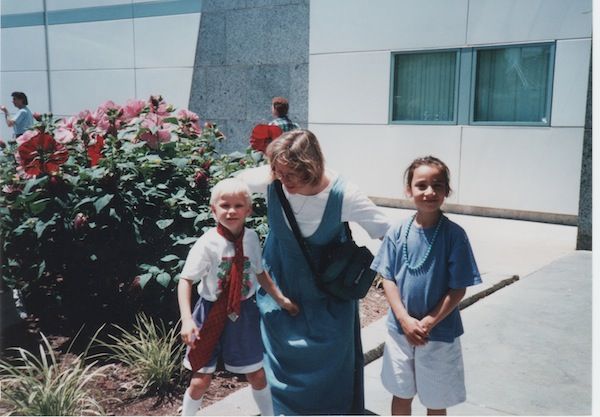My two were style mavens from the moment they first set foot in this country
While the world has seen more than its share of horrors and outrages during this year, my heart ached particularly when the Russian president, Vladimir Putin, signed the law banning adoptions of Russian children by Americans. The level of cruelty behind this move is beyond understanding. I speak from the perspective of one of those parents who gave her heart to two school-aged children she first met through a shaky video years ago showing a roomful of Russian children all trying to “out-cute” each other in order to win the golden ticket that would send them to forever families across the ocean.
I cry inside for the parents who have chosen their children but may never get to hold them. I cry for all of the children who will never find families if the ban stays in place. While the administrative paperwork and amount of money involved in international adoptions makes it seem like a business transaction, the creation of families happens in an instant. Believe me, when you look at a video and choose your children, you are immediately as hopelessly in love with them as any parents are with their unborn baby after hearing “you’re pregnant” from a doctor. So to lose this child in the middle of the adoption procedure is as traumatic as a miscarriage. Only this time it’s much worse because the children – who have no sense of the politics – are left to believe that they’re damaged goods or completely unlovable.
The new law is in retaliation for a recent law in the United States that banned those in Russia accused of human rights abuses from traveling to or owning assets in the U.S. So 650,000 children remain in a holding pattern of foster homes and orphanages. About 120,000 are available for adoption. A large percentage of those are special needs cases. My husband and I were blessed that our two children didn’t come to us disabled, did not suffer from H.I.V., or have any known diseases, but they had an enormous number of special needs after living every minute of the first eight years of their lives in an institution.
Some people say that the ban is good because there are children in the U.S. who need homes. Americans shouldn’t cross the ocean to find one to adopt, they say. We should focus our attention on those here. However, with so many children all over the globe who need families, we should all rejoice when any one of them finds a home. The decision to adopt internationally (or adopt at all) is not made lightly, so those who choose this long, expensive, and difficult route shouldn’t be second-guessed any more than they should be considered saints. They’re simply following their heart to where their longed-for children live.
Some in Russia say the ban is good because the country shouldn’t be giving away its children. The truth of the matter is, though, that many countries don’t nurture an adoption culture. Issues of poverty, rules of inheritance, cultural distinctions, religious laws and the like discourage families from embracing unrelated children as their own. With this new blockade raised, I’m not sure what plan Russia has now for locating homes for the hundreds of thousands of children currently languishing in its institutions. It currently has only about 18,000 families registered to adopt.
However, I do know what will happen to those children who fail to find a home before they age out of the system between 16 and 18 years old. Generations to come will end up on the street without money, without support, with little education, with no one to love them. Russia passed its new law in retaliation for our law against human rights abusers. Unfortunately, the only ones who will actually suffer real consequences are the children waiting day after day for a mommy or daddy to take them home, wherever that home may be. It’s just one more abusive blow to them.
I can only imagine the agony of the American parents-in-waiting who are caught in the middle of this game of political one-upmanship. I can’t bear to imagine where my beautiful children would be now if my husband and I hadn’t been able to bring them home 17 years ago. While countries might wildly disagree on any number of issues, it just seems so basic to me that a universal and unwritten agreement would exist that you don’t hold children hostage for political gain. Haven’t children in an orphanage already lost enough?
Now everybody go hug your children – because you can.
I don’t often write overtly political blog posts. Today I’m not sure what question to leave you with. Perhaps you can talk to me in the comments box about children’s issues that occupy your mind and heart.
I cry inside for the parents who have chosen their children but may never get to hold them. I cry for all of the children who will never find families if the ban stays in place. While the administrative paperwork and amount of money involved in international adoptions makes it seem like a business transaction, the creation of families happens in an instant. Believe me, when you look at a video and choose your children, you are immediately as hopelessly in love with them as any parents are with their unborn baby after hearing “you’re pregnant” from a doctor. So to lose this child in the middle of the adoption procedure is as traumatic as a miscarriage. Only this time it’s much worse because the children – who have no sense of the politics – are left to believe that they’re damaged goods or completely unlovable.
The new law is in retaliation for a recent law in the United States that banned those in Russia accused of human rights abuses from traveling to or owning assets in the U.S. So 650,000 children remain in a holding pattern of foster homes and orphanages. About 120,000 are available for adoption. A large percentage of those are special needs cases. My husband and I were blessed that our two children didn’t come to us disabled, did not suffer from H.I.V., or have any known diseases, but they had an enormous number of special needs after living every minute of the first eight years of their lives in an institution.
Some people say that the ban is good because there are children in the U.S. who need homes. Americans shouldn’t cross the ocean to find one to adopt, they say. We should focus our attention on those here. However, with so many children all over the globe who need families, we should all rejoice when any one of them finds a home. The decision to adopt internationally (or adopt at all) is not made lightly, so those who choose this long, expensive, and difficult route shouldn’t be second-guessed any more than they should be considered saints. They’re simply following their heart to where their longed-for children live.
Some in Russia say the ban is good because the country shouldn’t be giving away its children. The truth of the matter is, though, that many countries don’t nurture an adoption culture. Issues of poverty, rules of inheritance, cultural distinctions, religious laws and the like discourage families from embracing unrelated children as their own. With this new blockade raised, I’m not sure what plan Russia has now for locating homes for the hundreds of thousands of children currently languishing in its institutions. It currently has only about 18,000 families registered to adopt.
However, I do know what will happen to those children who fail to find a home before they age out of the system between 16 and 18 years old. Generations to come will end up on the street without money, without support, with little education, with no one to love them. Russia passed its new law in retaliation for our law against human rights abusers. Unfortunately, the only ones who will actually suffer real consequences are the children waiting day after day for a mommy or daddy to take them home, wherever that home may be. It’s just one more abusive blow to them.
I can only imagine the agony of the American parents-in-waiting who are caught in the middle of this game of political one-upmanship. I can’t bear to imagine where my beautiful children would be now if my husband and I hadn’t been able to bring them home 17 years ago. While countries might wildly disagree on any number of issues, it just seems so basic to me that a universal and unwritten agreement would exist that you don’t hold children hostage for political gain. Haven’t children in an orphanage already lost enough?
Now everybody go hug your children – because you can.
I don’t often write overtly political blog posts. Today I’m not sure what question to leave you with. Perhaps you can talk to me in the comments box about children’s issues that occupy your mind and heart.







![Grace [Eventually]: Thoughts on Faith](http://photo.goodreads.com/books/1166504427s/12542.jpg)








